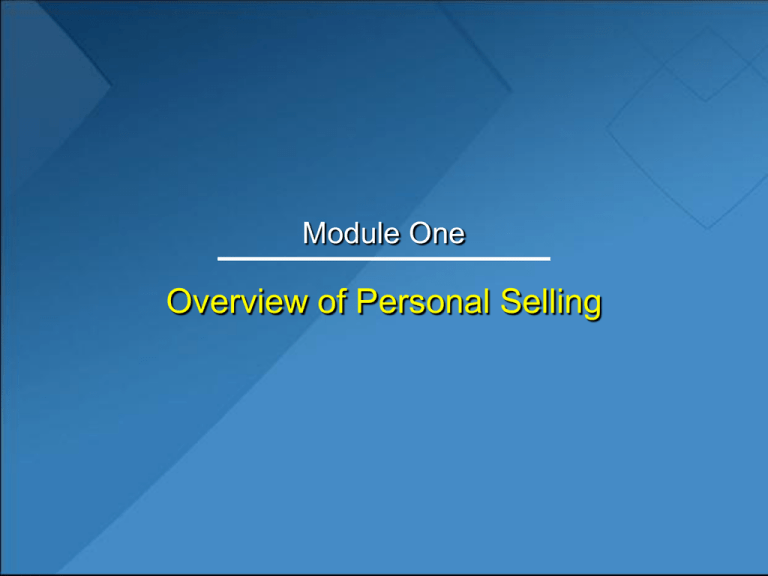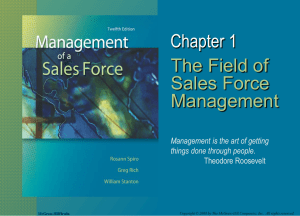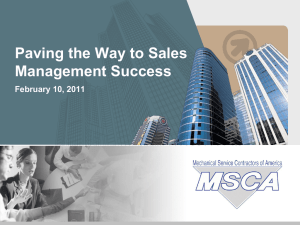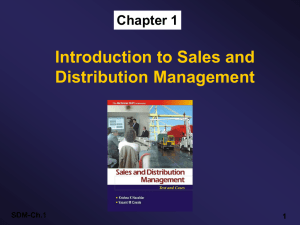Chapter 1
advertisement

Module One Overview of Personal Selling Learning Objectives 1. Describe the evolution of personal selling from ancient times to the modern era. 2. Explain the contributions of personal selling to society, business firms, and customers. 3. Distinguish between transaction-focused traditional selling and trust-based relationship selling. Learning Objectives 4. Discuss five alternative approaches to selling. 5. Describe the three primary roles fulfilled by consultative salespeople 6. Understand the sales process as a series of interrelated steps. Key Thoughts • Selling has been around since there were goods to trade. • The role of the salesperson has evolved . . . becoming more professional. • Salespeople play an important role in creating and maintaining a strong economy. • Salespeople are solution providers. • Sales is a process focusing on initiating, developing, and enhancing customer relationships. Personal Selling – Defined Personal selling is an organizational function that creates, communicates, and delivers value to customers and manages customer relationships in ways that benefit both the organization and its stakeholders. Evolution of Personal Selling Peddlers selling door to door . . . served as intermediaries Selling function became more structured 1800s 1900s 2000s As we beginPost-Industrial the 21st century, selling to develop, Industrial Warcontinues and Modern more professional and more relational Era Revolution becoming Revolution Depression Business organizations employed salespeople Selling function became more professional Contributions of Personal Selling: Salespeople and Society • Salespeople help stimulate the economy • Salespeople help with the diffusion of innovation Contributions of Personal Selling: Salespeople and the Employing Firm • Salespeople generate revenue • Salespeople provide market research and customer feedback • Salespeople become future leaders in the organization Contributions of Personal Selling: Salespeople and the Customer • Salespeople provide solutions to problems • Salespeople provide expertise and serve as information resources • Salespeople serve as advocates for the customer when dealing with the selling organization Transaction-Focused vs. Relationship Focused Transaction-Focused Relationship-Focused • • • • • • Short term thinking Making the sale has priority over most other considerations Interaction between buyer and seller is competitive Salesperson is selfinterest oriented • • Long term thinking Developing the relationship takes priority over getting the sale Interaction between buyer and seller is collaborative. Salesperson is customer-oriented Classification of Personal Selling Approaches • • • • Stimulus Response Selling Mental States Selling Need Satisfaction Selling Problem Solving Selling Stimulus Response Selling Salesperson Provides Stimuli Buyer Responses Sought Continue Process until Purchase Decision Simple in design; assumes conditioned response improves likelihood of success; a risky and unreliable strategy. Mental States Selling Attention Interest Conviction Desire Assumes buyer can be led through mental states; promotes one-way communication; a risky and unreliable strategy. Action Need Satisfaction Selling Uncover and Confirm Buyer Needs Present Offering to Satisfy Buyer Needs Continue Selling until Purchase Decision Interact with buyer to determine existing needs; present solutions to needs; solutions limited to seller’s products. Problem Solving Selling Define Problem Generate Alternative Solutions Evaluate Alternative Solutions Interact with buyer to determine existing and potential needs; present multiple solutions not limited to seller’s products. Continue Selling until Purchase Decision Consultative Selling Business Consultant The process of helping customers reach their strategic goals by using the products, service, and expertise of the selling organization. Strategic Orchestrator Long-term Ally The Sales Process: An Overview Selling Foundations Initiating Customer Relationships Selling Strategy Developing Customer Relationships Enhancing Customer Relationships The Sales Process: Selling Foundations In order to be successful in today’s global business environment, salespeople must have a solid relationship building foundation. They must: Be Trustworthy Behave Ethically Understand Buyer Behavior Possess Excellent Communication Skills The Sales Process: Selling Strategy In order to be successful in today’s global business environment, salespeople must also think and act strategically. The must develop strategies for: Each Sales Call Each Customer Their Sales Territories Each strategy is related to the other The Sales Process Initiating Customer Relationships Developing Customer Relationships • Sales Prospecting Presentation Delivery • Earning Preapproach Customer Commitment Adding Value through Follow-up, • Presentation Planning Self-leadership, and Teamwork • Approaching the Customer Enhancing Customer Relationships Module One – Appendix Sales Careers Characteristics of Sales Careers • • • • • • • Job Security Advancement Opportunities Immediate Feedback Prestige Job Variety Independence Compensation Job Security Selling skills are readily transferable from industry to industry….and the need for good salespeople will never go away. Accordingly, good salespeople have opportunities within and across industries. Advancement Opportunities Salespeople are familiar with the market, the customers, and the products. In addition, good salespeople have great interpersonal skills. These attributes help to make salespeople good candidates for leadership in the organization. Immediate Feedback & Prestige Customer responses to the salesperson’s efforts are typically immediate…providing the salesperson performance feedback and the opportunity to adjust “on the fly.” The role of the professional salesperson is not well known by the general public and is eclipsed by negative stereo types . . . but that is slowly changing. Job Variety and Independence Professional selling is rarely the same from day-to-day. The word “routine” doesn’t apply. Usually, salespeople are accountable for attaining certain goals…how they get there is up to them. There is no “time-clock” and no taskmaster. Compensation Good salespeople usually earn an income well above the national average. Many salespeople earn six figure incomes (or higher). Income is most often tied directly to performance. Sales Support • Promote or Otherwise Support a “Pull-Through” Strategy – Missionary Salespeople – Detailers • Support the Salesperson’s Efforts – Technical Support – Installation Other Defining Characteristics The primary focus of the selling activities – Generate new accounts – Maintain existing accounts – Combination Where the selling conducted – Inside – Outside How the selling conducted – Telephone – Field Characteristics of Successful Salespeople • • • • • • Empathy Ego Drive Ego Strength Motivation Ethical Behavior Interpersonal Communication Skills







